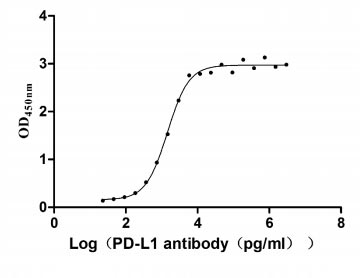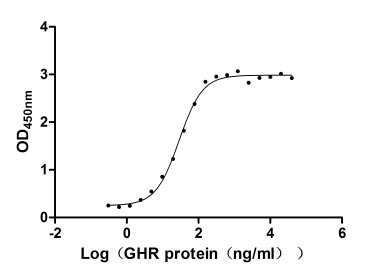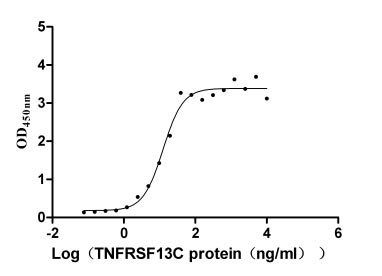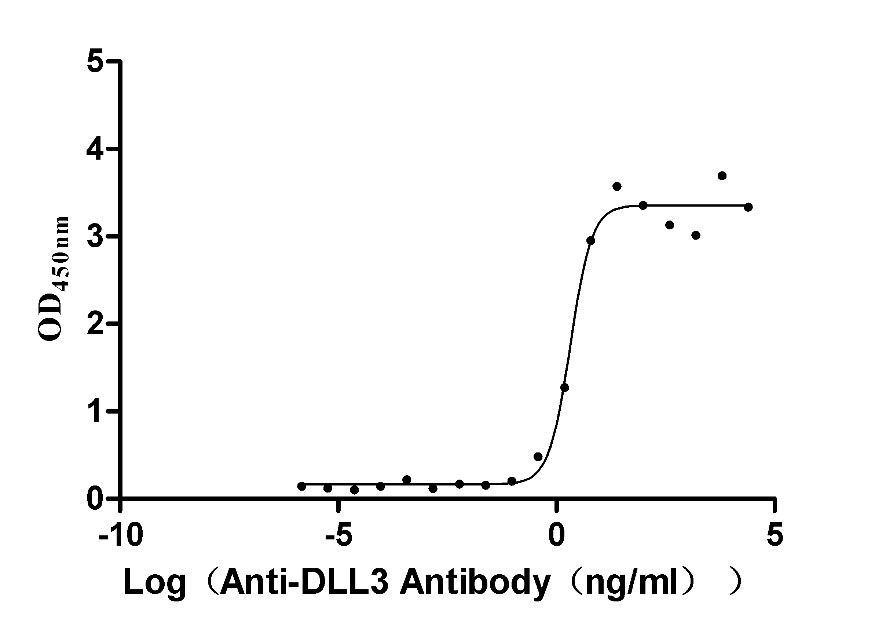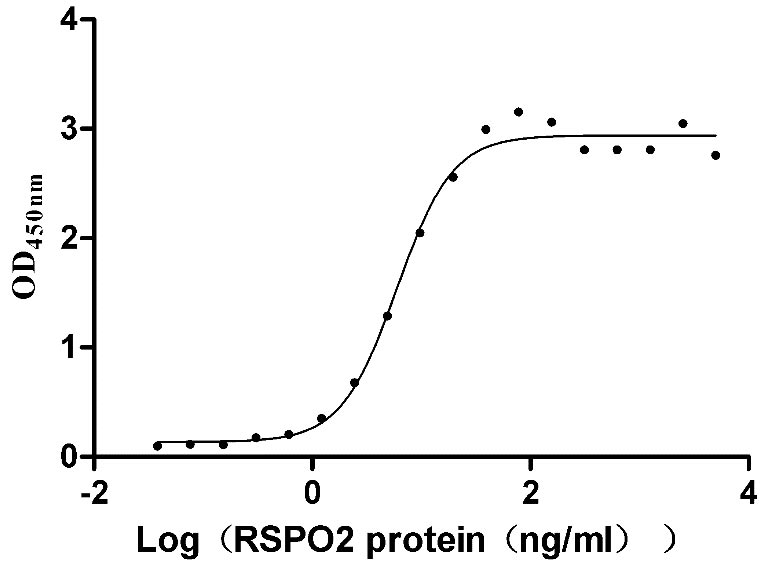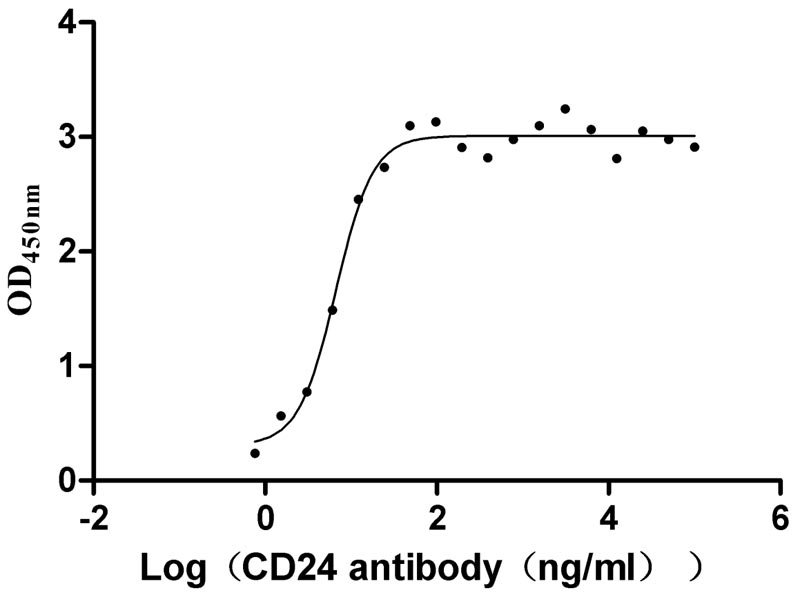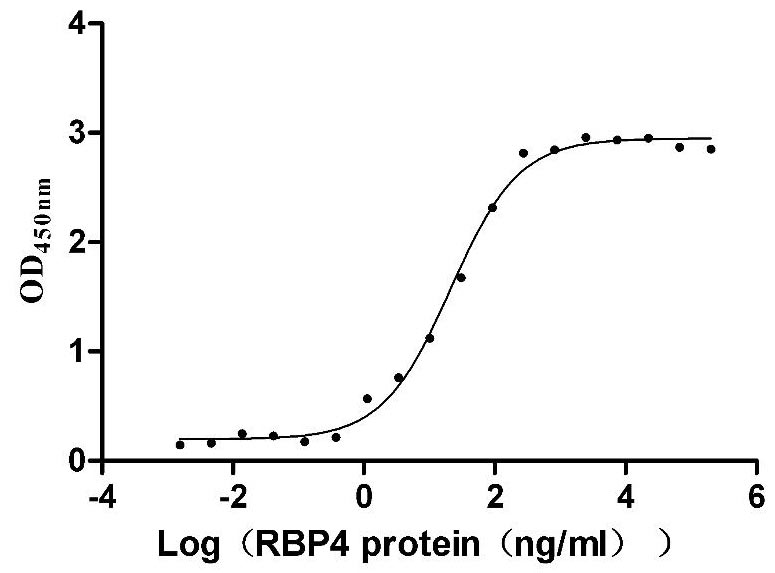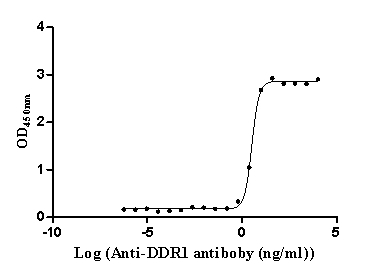Recombinant Human Sodium- and chloride-dependent creatine transporter 1 (SLC6A8), partial
-
中文名称:人SLC6A8重组蛋白
-
货号:CSB-YP021707HU
-
规格:
-
来源:Yeast
-
其他:
-
中文名称:人SLC6A8重组蛋白
-
货号:CSB-EP021707HU
-
规格:
-
来源:E.coli
-
其他:
-
中文名称:人SLC6A8重组蛋白
-
货号:CSB-EP021707HU-B
-
规格:
-
来源:E.coli
-
共轭:Avi-tag Biotinylated
E. coli biotin ligase (BirA) is highly specific in covalently attaching biotin to the 15 amino acid AviTag peptide. This recombinant protein was biotinylated in vivo by AviTag-BirA technology, which method is BriA catalyzes amide linkage between the biotin and the specific lysine of the AviTag.
-
其他:
-
中文名称:人SLC6A8重组蛋白
-
货号:CSB-BP021707HU
-
规格:
-
来源:Baculovirus
-
其他:
-
中文名称:人SLC6A8重组蛋白
-
货号:CSB-MP021707HU
-
规格:
-
来源:Mammalian cell
-
其他:
产品详情
-
纯度:>85% (SDS-PAGE)
-
基因名:SLC6A8
-
Uniprot No.:
-
别名:SLC6A 8; SLC6A8; Creatine transporter 1; Creatine transporter SLC6A8; CRT; CRTR; CT 1; CT1; MGC87396; SC6A8_HUMAN; Slc6a8; Sodium and chloride-dependent creatine transporter 1; Sodium- and chloride-dependent creatine transporter 1; Solute carrier family 6 (neurotransmitter transporter, creatine), member 8.; Solute carrier family 6 member 8
-
种属:Homo sapiens (Human)
-
蛋白长度:Partial
-
蛋白标签:Tag type will be determined during the manufacturing process.
The tag type will be determined during production process. If you have specified tag type, please tell us and we will develop the specified tag preferentially. -
产品提供形式:Lyophilized powder
Note: We will preferentially ship the format that we have in stock, however, if you have any special requirement for the format, please remark your requirement when placing the order, we will prepare according to your demand. -
复溶:We recommend that this vial be briefly centrifuged prior to opening to bring the contents to the bottom. Please reconstitute protein in deionized sterile water to a concentration of 0.1-1.0 mg/mL.We recommend to add 5-50% of glycerol (final concentration) and aliquot for long-term storage at -20℃/-80℃. Our default final concentration of glycerol is 50%. Customers could use it as reference.
-
储存条件:Store at -20°C/-80°C upon receipt, aliquoting is necessary for mutiple use. Avoid repeated freeze-thaw cycles.
-
保质期:The shelf life is related to many factors, storage state, buffer ingredients, storage temperature and the stability of the protein itself.
Generally, the shelf life of liquid form is 6 months at -20°C/-80°C. The shelf life of lyophilized form is 12 months at -20°C/-80°C. -
货期:Delivery time may differ from different purchasing way or location, please kindly consult your local distributors for specific delivery time.Note: All of our proteins are default shipped with normal blue ice packs, if you request to ship with dry ice, please communicate with us in advance and extra fees will be charged.
-
注意事项:Repeated freezing and thawing is not recommended. Store working aliquots at 4°C for up to one week.
-
Datasheet :Please contact us to get it.
相关产品
靶点详情
-
功能:Required for the uptake of creatine in muscles and brain.
-
基因功能参考文献:
- Measurements of creatine and guanidinoacetate in plasma are recommended for the diagnosis of AGAT and GAMT deficiency.Definitive confirmation of the diagnosis requires DNA sequencing of the appropriate gene and (if molecular analysis is ambiguous) measurement of AGAT or GAMT enzyme activity or of CRTR-mediated transport PMID: 28055022
- The present study demonstrated that a novel CRT missense mutation in exon 12 of the SLC6A8 gene (c.1681G>C; p.G561R) causes suppression of creatine transport activity PMID: 28049948
- Data suggest that a specific plasma membrane transporter, creatine transporter (SLC6A8), enables cells to incorporate creatine; creatine uptake is controlled by AMP-activated protein kinase, a ubiquitous sensor of energy depletion. [REVIEW] PMID: 26542286
- both BCAP31 and ABCD1 were associated with hepatic cholestasis and death before 1 year. Remarkably, a patient with an isolated deletion at the 3'-end of SLC6A8 had a similar severe phenotype as seen in BCAP31 deficiency PMID: 24597975
- Klotho protein up-regulates the activity of creatine transporter CreaT (Slc6A8) by stabilizing the carrier protein in the cell membrane PMID: 25531216
- Both SPAK and OSR1 are negative regulators of the creatine transporter SLC6A8 PMID: 25531585
- The SLC6A8 c.1654G>T (p.Val552Leu) variant showed low residual creatine uptake activity of 35% of wild type transfected HeLa cells. PMID: 25861866
- In the titel. PMID: 25044748
- Understanding the pathogenesis of creatine transporter deficiency is of paramount importance in the development of an effective treatment PMID: 24789340
- It is likely that the (extracellular) structure of brain cells is also impaired in SLC6A8-deficient patients, and future studies are necessary to confirm this and to reveal the true functions of creatine in the brain. PMID: 24962355
- CTR4 and CTR5 are possible regulators of the creatine transporter since their overexpression results in upregulated CTR1 protein and creatine uptake. PMID: 24561156
- Combination of deep sequencing technology with long-range PCR revealed a novel intragenic duplication in the SLC6A8 gene, providing a definitive molecular diagnosis of creatine transporter deficiency in a male patient. PMID: 24140398
- Creatine transporter deficiency is a relatively common genetic disorder in males with sporadic or familiar mental retardation and diagnostic screening of them should always include screening for SLC6A8 deficiency. PMID: 24137762
- a de novo mutation in the SLC6A8 gene in 101 males with X-linked creatine transporter deficiency PMID: 23644449
- study identified a second creatine transporter monocarboxylate transporter 12 (MCT12), encoded by the cataract and glucosuria associated gene SLC16A12; Rssults show SLC6A8 was predominantly found in brain, heart and muscle, while SLC16A12 was more abundant in kidney and retina. In the lens, the two transcripts were found at comparable levels. PMID: 23578822
- a 1104 bp sequence proximal to the mRNA start site of the SLC6A8 gene with promoter activity in five cell types was identified. PMID: 24144841
- SLC6A8 mutants displayed no electrogenic activity with all Cr analogs tested in X. laevis oocytes. PMID: 22644605
- report the first two Spanish adult patients with creatine transporter deficiency and compare their clinical phenotype and the evolution of the disease with those of other published cases PMID: 19319661
- Missense mutations in SLC6A8 gene is associated with X-linked disorder. PMID: 22281021
- analysis of X-linked creatine transporter defect in nine boys shows that it has an effect on IQ PMID: 21556832
- impact of creatine deficiency syndrome mutations, CRTR and GAMT on metabolic stress was analyzed in patient fibroblast cultures PMID: 21140503
- Evidence for a functional involvement of the four mutations affecting ATRX (p.1761M4T), PQBP1 (p.155R4X), and SLC6A8 (p.390P4L and p.477S4L), in the etiology of intellectual disability. PMID: 21267006
- symptoms of the creatine transporter defect (mental retardation, learning difficulties, and constipation) can be present in female SLC6A8 heterozygotes PMID: 20528887
- SLC6A8 genes may not be directly involved in human male infertility PMID: 21190923
- Heterozygous SLC6A8 deficiency is a potentially treatable condition and should be considered in females with intractable epilepsy and developmental delay/intellectual disabilit PMID: 20846889
- Hemizygosity for a novel deletion producing a frameshift (c.974_975delCA, p.Thr325SerfsX139) in the creatine transporter gene is associated with X-linked cerebral creatine deficiency. PMID: 20602486
- Guanidinoacetate is transported from AGAT- to GAMT-expressing cells through SLC6A8 to allow creatine synthesis, thereby explaining creatine deficiency in SLC6A8-deficient CNS. PMID: 19879361
- X-linked mental retardation with seizures and carrier manifestations is caused by a mutation in the creatine-transporter gene (SLC6A8) located in Xq28 PMID: 11898126
- X-linked creatine deficiency syndrome: a novel mutation in creatine transporter gene SLC6A8. PMID: 12210795
- High prevalence of SLC6A8 deficiency in X-linked mental retardation PMID: 15154114
- involvement of residues from transmembrane domain 3 is a common feature of the substrate pathway of the creatine transporter PMID: 16049011
- Creatine transporter deficiency associated with gene deficiency of this protein. PMID: 16086185
- Mutations in the creatine transporter gene SLC6A8 may be a relatively major contributor in males with mental retardation of unknown cause. PMID: 16738945
- Exhibition of a developmental apraxia of speech with motor planning and execution deficit in a creatine transporter (SLC6A8) mutation. PMID: 17603797
- identified two brothers with mental retardation, caused by a c.1059_1061delCTT; p.Phe354del mutation in the SLC6A8 gene PMID: 18350323
- A novel deletion (c.1690-1703 del) in exon 12 of SLC6A8 resulted in a frameship mutation associated with global developmental delay and premature ventricular beats. PMID: 18443316
- This study reveals the presence of a novel SLC6A8 splice variant, SLC6A8C in human and mouse. PMID: 18515020
- The frequency of SLC6A8 deficiency was 2.3% in 157 males at risk. PMID: 19188083
- The estimated amount of total creatine in the placenta and brain significantly increased in the second half of pregnancy, coinciding with a significant increase in expression of CrT mRNA. PMID: 19570237
显示更多
收起更多
-
相关疾病:Cerebral creatine deficiency syndrome 1 (CCDS1)
-
亚细胞定位:Membrane; Multi-pass membrane protein.
-
蛋白家族:Sodium:neurotransmitter symporter (SNF) (TC 2.A.22) family, SLC6A8 subfamily
-
组织特异性:Predominantly expressed in skeletal muscle and kidney. Also found in brain, heart, colon, testis and prostate.
-
数据库链接:
Most popular with customers
-
Recombinant Human Programmed cell death 1 ligand 1 (CD274), partial (Active)
Express system: Mammalian cell
Species: Homo sapiens (Human)
-
Recombinant Human Growth hormone receptor (GHR), partial (Active)
Express system: Mammalian cell
Species: Homo sapiens (Human)
-
Express system: Mammalian cell
Species: Homo sapiens (Human)
-
Recombinant Macaca fascicularis Delta-like protein 3 (DLL3), partial (Active)
Express system: Mammalian cell
Species: Macaca fascicularis (Crab-eating macaque) (Cynomolgus monkey)
-
Recombinant Human E3 ubiquitin-protein ligase ZNRF3 (ZNRF3), partial (Active)
Express system: Mammalian cell
Species: Homo sapiens (Human)
-
Recombinant Human Signal transducer CD24 (CD24)-Nanoparticle (Active)
Express system: Mammalian cell
Species: Homo sapiens (Human)
-
Recombinant Mouse Transthyretin (Ttr) (Active)
Express system: Mammalian cell
Species: Mus musculus (Mouse)
-
Recombinant Human Epithelial discoidin domain-containing receptor 1 (DDR1), partial (Active)
Express system: Mammalian cell
Species: Homo sapiens (Human)


